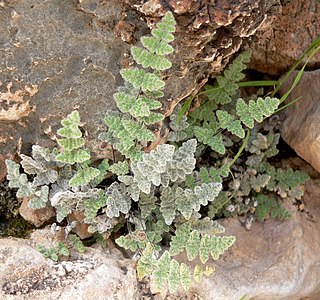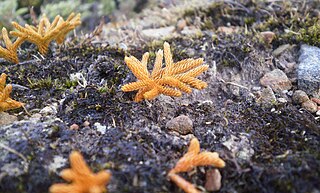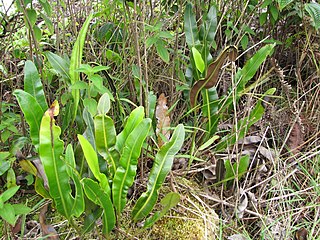
The Lycopodiaceae are an old family of vascular plants, including all of the core clubmosses and firmosses, comprising 16 accepted genera and about 400 known species. This family originated about 380 million years ago in the early Devonian, though the diversity within the family has been much more recent. "Wolf foot" is another common name for this family due to the resemblance of either the roots or branch tips to a wolf's paw.

Blechnum, known as hard fern, is a genus of ferns in the family Blechnaceae, subfamily Blechnoideae, according to the Pteridophyte Phylogeny Group classification of 2016. Two very different circumscriptions of the genus are used by different authors. In the PPG I system, based on Gasper et al. (2016), Blechnum is one of 18 genera in the subfamily Blechnoideae, and has about 30 species. Other sources use a very broadly defined Blechnum s.l., including accepting only two other genera in the subfamily. The genus then has about 250 species. In the PPG I circumscription, the genus is mostly neotropical, with a few southern African species.

Thelypteris is a genus of ferns in the subfamily Thelypteridoideae, family Thelypteridaceae, order Polypodiales. Two radically different circumscriptions of the genus are in use as of January 2020. In the Pteridophyte Phylogeny Group classification of 2016, the genus is a very small one with about two species. In other approaches, the genus is the only one in the subfamily Thelypteridoideae, and so includes between 875 and 1083 species.
Cheiroglossa is a genus of fern in the family Ophioglossaceae, subfamily Ophioglossoideae, with two species. Although recognized as a separate genus in the Pteridophyte Phylogeny Group classification of 2016, other sources regard it as a synonym of the genus Ophioglossum.

Austrolycopodium magellanicum, synonym Lycopodium magellanicum, the Magellanic clubmoss, is a species of vascular plant in the club moss family Lycopodiaceae. The genus Austrolycopodium is accepted in the Pteridophyte Phylogeny Group classification of 2016, but not in other classifications which submerge the genus in Lycopodium.

Cheilanthoideae is one of the five subfamilies of the fern family Pteridaceae. The subfamily is thought to be monophyletic, but some of the genera into which it has been divided are not, and the taxonomic status of many of its genera and species remains uncertain, with radically different approaches in use as of December 2019.

Austrolycopodium fastigiatum, synonym Lycopodium fastigiatum, commonly known as alpine club moss or mountain club moss, is a species of club moss native to New Zealand and Australia. The genus Austrolycopodium is accepted in the Pteridophyte Phylogeny Group classification of 2016, but not in other classifications which submerge the genus in Lycopodium.

Cephalomanes is a fern genus in the family Hymenophyllaceae. The genus is accepted in the Pteridophyte Phylogeny Group classification of 2016 but not by other sources, which sink it into a broadly defined Trichomanes.

Callistopteris is a fern genus in the family Hymenophyllaceae. The genus is accepted in the Pteridophyte Phylogeny Group classification of 2016 but not by some other sources, which sink it into a broadly defined Trichomanes.

Polyphlebium is a fern genus in the family Hymenophyllaceae. The genus is accepted in the Pteridophyte Phylogeny Group classification of 2016 but not by some other sources.
Japanobotrychum is a genus of ferns in the family Ophioglossaceae with the sole species Japanobotrychum lanuginosum. The genus is accepted in the Pteridophyte Phylogeny Group classification of 2016, but not by some other sources.

Austrolycopodium is a genus of lycophytes in the family Lycopodiaceae. In the Pteridophyte Phylogeny Group classification of 2016, it is placed in the subfamily Lycopodioideae. Some sources do not recognize the genus, sinking it into Lycopodium. Austrolycopodium species are mostly native to the temperate southern hemisphere.

Lycopodioideae is a subfamily in the family Lycopodiaceae in the Pteridophyte Phylogeny Group classification of 2016. It is equivalent to a broad circumscription of the genus Lycopodium in other classifications. Like all lycophytes, members of the Lycopodioideae reproduce by spores. The oldest fossils of modern members of the subfamily date to the Early Cretaceous.

Blechnopsis is a small genus of ferns in the family Blechnaceae, subfamily Blechnoideae, according to the Pteridophyte Phylogeny Group classification of 2016. The genus is accepted in a 2016 classification of the family Blechnaceae, but other sources sink it into a very broadly defined Blechnum, equivalent to the whole of the PPG I subfamily.

Diploblechnum is a genus of ferns in the family Blechnaceae, subfamily Blechnoideae, according to the Pteridophyte Phylogeny Group classification of 2016. The genus is accepted in a 2016 classification of the family Blechnaceae, but other sources sink it into a very broadly defined Blechnum, equivalent to the whole of the PPG I subfamily.

Oceaniopteris is a genus of ferns in the family Blechnaceae, subfamily Blechnoideae, according to the Pteridophyte Phylogeny Group classification of 2016. The genus is accepted in a 2016 classification of the family Blechnaceae, but other sources sink it into a very broadly defined Blechnum, equivalent to the whole of the PPG I subfamily.

Icarus is a genus of ferns in the family Blechnaceae, subfamily Blechnoideae, with a single species Icarus filiformis, according to the Pteridophyte Phylogeny Group classification of 2016. The genus is accepted in a 2016 classification of the family Blechnaceae, but other sources sink it into a very broadly defined Blechnum, equivalent to the whole of the PPG I subfamily.
Rheopteris is a genus of ferns in the subfamily Vittarioideae of the family Pteridaceae with a single species, Rheopteris cheesmaniae, in the Pteridophyte Phylogeny Group classification of 2016. Other sources sink the genus into Monogramma, a genus not recognized in PPG I. The species is native to New Guinea.

Hemionitis is a genus of ferns in the subfamily Cheilanthoideae of the family Pteridaceae. Its circumscription varies greatly in different systems of fern classification. In the Pteridophyte Phylogeny Group classification of 2016, it was one of more than 20 genera in the subfamily Cheilanthoideae, and was said to have five species. Other sources treat it as the only genus in the subfamily, and so accept about 450 species. With the restricted circumscription, species are native to tropical America.

Elaphoglossum is a genus of ferns in the family Dryopteridaceae, subfamily Elaphoglossoideae, in the Pteridophyte Phylogeny Group classification of 2016.















